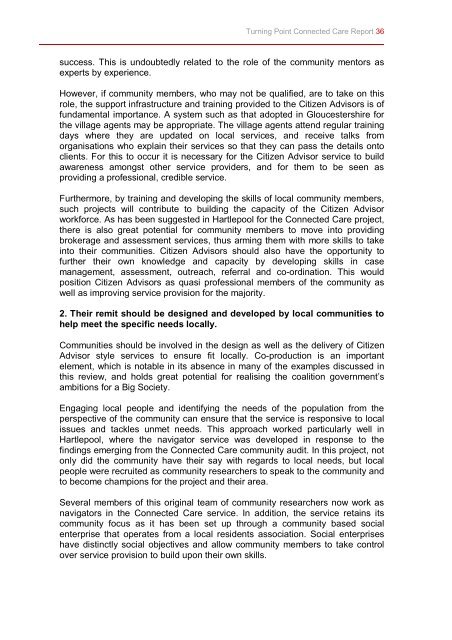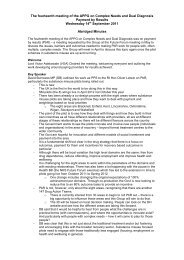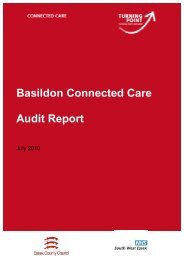Citizen Advisors - Turning Point
Citizen Advisors - Turning Point
Citizen Advisors - Turning Point
Create successful ePaper yourself
Turn your PDF publications into a flip-book with our unique Google optimized e-Paper software.
<strong>Turning</strong> <strong>Point</strong> Connected Care Report 36<br />
success. This is undoubtedly related to the role of the community mentors as<br />
experts by experience.<br />
However, if community members, who may not be qualified, are to take on this<br />
role, the support infrastructure and training provided to the <strong>Citizen</strong> <strong>Advisors</strong> is of<br />
fundamental importance. A system such as that adopted in Gloucestershire for<br />
the village agents may be appropriate. The village agents attend regular training<br />
days where they are updated on local services, and receive talks from<br />
organisations who explain their services so that they can pass the details onto<br />
clients. For this to occur it is necessary for the <strong>Citizen</strong> Advisor service to build<br />
awareness amongst other service providers, and for them to be seen as<br />
providing a professional, credible service.<br />
Furthermore, by training and developing the skills of local community members,<br />
such projects will contribute to building the capacity of the <strong>Citizen</strong> Advisor<br />
workforce. As has been suggested in Hartlepool for the Connected Care project,<br />
there is also great potential for community members to move into providing<br />
brokerage and assessment services, thus arming them with more skills to take<br />
into their communities. <strong>Citizen</strong> <strong>Advisors</strong> should also have the opportunity to<br />
further their own knowledge and capacity by developing skills in case<br />
management, assessment, outreach, referral and co-ordination. This would<br />
position <strong>Citizen</strong> <strong>Advisors</strong> as quasi professional members of the community as<br />
well as improving service provision for the majority.<br />
2. Their remit should be designed and developed by local communities to<br />
help meet the specific needs locally.<br />
Communities should be involved in the design as well as the delivery of <strong>Citizen</strong><br />
Advisor style services to ensure fit locally. Co-production is an important<br />
element, which is notable in its absence in many of the examples discussed in<br />
this review, and holds great potential for realising the coalition government’s<br />
ambitions for a Big Society.<br />
Engaging local people and identifying the needs of the population from the<br />
perspective of the community can ensure that the service is responsive to local<br />
issues and tackles unmet needs. This approach worked particularly well in<br />
Hartlepool, where the navigator service was developed in response to the<br />
findings emerging from the Connected Care community audit. In this project, not<br />
only did the community have their say with regards to local needs, but local<br />
people were recruited as community researchers to speak to the community and<br />
to become champions for the project and their area.<br />
Several members of this original team of community researchers now work as<br />
navigators in the Connected Care service. In addition, the service retains its<br />
community focus as it has been set up through a community based social<br />
enterprise that operates from a local residents association. Social enterprises<br />
have distinctly social objectives and allow community members to take control<br />
over service provision to build upon their own skills.
















